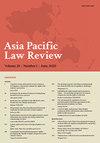What is so special about CAI?
IF 1.7
4区 社会学
Q2 LAW
引用次数: 0
Abstract
ABSTRACT This article examines the EU-China Comprehensive Agreement on Investment (CAI) in the light of investment chapters contained in trade agreements that China and the EU have signed (separately obviously) with two countries: the Republic of Korea, like most EU countries, a member of the Organization for Economic Co-operation and Development, and Vietnam, a developing country and a nonmarket economy, where, like in China, state-owned enterprises play a substantial role. We find that the CAI innovates compared to these earlier trade agreements in some important dimensions, especially as far as the commitments accepted by China are concerned. Hence, the bilateral EU-China investment agreement could be useful for a future multilateral agreement in areas where current WTO rules do not provide sufficient discipline for countries like China.CAI有什么特别之处?
本文从中国和欧盟与两个国家签署的贸易协定(显然是单独签署的)中包含的投资章节来考察欧盟-中国全面投资协定(CAI)。一个是韩国,像大多数欧盟国家一样,是经济合作与发展组织(oecd)成员国;另一个是越南,一个发展中国家和非市场经济国家,像中国一样,国有企业在其中发挥着重要作用。我们发现,与这些早期的贸易协定相比,CAI在一些重要方面有所创新,特别是就中国接受的承诺而言。因此,在当前WTO规则无法为中国等国家提供足够约束的领域,中欧双边投资协议可能有助于未来达成多边协议。
本文章由计算机程序翻译,如有差异,请以英文原文为准。
求助全文
约1分钟内获得全文
求助全文

 求助内容:
求助内容: 应助结果提醒方式:
应助结果提醒方式:


